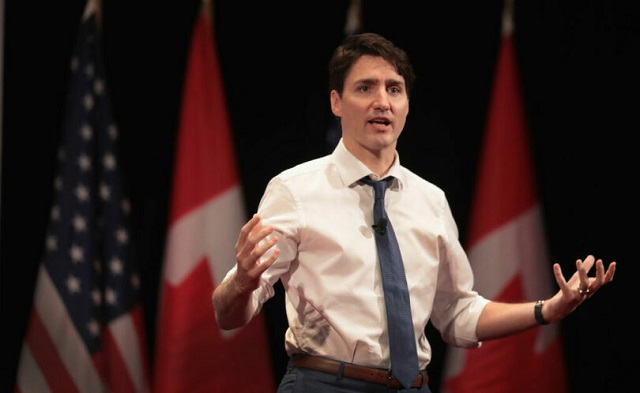National
Federal government touts climate ‘crisis’ without sufficient supporting evidence

From the Fraser Institute
Canada is, we are told, in a climate crisis. “Climate action can’t wait,” said Prime Minister Trudeau. “Together, we will beat this crisis while creating a green economy and new middle-class jobs for Canadians.” In a Guardian article, federal Environment Minister Steven Guilbeault said “the science is clear” that the “climate crisis is the biggest single threat we face as a global community.” And of course, the government’s new “Raising the Bar” campaign is very alarming, particularly the stuff about droughts and floods.
But have we seen significant increases in weather extremes? Is the strength of evidence sufficient to justify the panic-mongering language of a “climate crisis?” In a nutshell, no.
Let’s start with drought. The vaunted UN Intergovernmental Panel on Climate Change (IPCC) asserted “medium confidence” that increased drought has been observed across the globe. And in the Royal Society, one of oldest scientific academies on Earth, an international research team dug into the data only to find that in the “vast majority of the world, trends in meteorological drought duration and magnitude are not statistically significant, with the exception of some small regions of Africa and South America, which is also where data uncertainty is greater” concluding that “trends in meteorological drought severity in the last few decades are not observed globally based on precipitation data, and very few areas are showing changes in the severity of meteorological droughts.” Finally, according to the International Energy Agency, drought severity in Canada from 2000 to 2020 was only slightly above the global average.
Well, but what about floods?
Canada has plenty of those. The IPCC report finds it “likely” that heavy precipitation events (a major cause of flooding) have increased globally, at least over land areas with good data. The report has less confidence in places such as Africa and South America where we’re reminded the people are at higher risk from climate change because they’re poorer and less likely to adapt. But a 2017 report of the United States Global Climate Research Project found that while “detectable changes in some classes of flood frequency have occurred in parts of the United States” there’s no “significant connection of increased riverine flooding to human-induced climate change, and the timing of any emergence of a future detectable anthropogenic change in flooding is unclear.” Further, a recent UN report found with “high confidence” that “streamflow trends since 1950 are not statistically significant in most of the world’s largest rivers, while flood frequency and extreme streamflow have increased in some regions.” Does that sounds like a crisis?
The Trudeau government’s climate rhetoric has steadily ratcheted up over years, and settled on the panic-inducing language of “crisis.” We must follow government’s energy-diet, live smaller, less prosperous lives in less space, with less travel, and less, well, everything. Of course, the crisis rhetoric allows for no doubts, being absolutist in its claims that we are—right now—experiencing major increases in natural disasters fuelled by human-sourced greenhouse gas emissions.
But clearly, the scientific literature on extreme weather does not support this rhetoric. The actual data on extreme weather is scant, fragmented, contradictory and in all ways uncertain. It’s certainly not rigorous enough to justify the kind of exaggerated certainty Ottawa asserts nor the induction of climate panic.
Author:
COVID-19
Pfizer reportedly withheld presence of cancer-linked DNA in COVID jabs from FDA, Health Canada

From LifeSiteNews
According to information released by the Epoch Times, Pfizer purposefully failed to advise drug regulators, including Health Canada, the U.S. FDA and the European Medicines Agency, that the cancer-linked SV40 DNA enhancer was present in their experimental COVID shot.
Pharmaceutical giant Pfizer reportedly “chose not to” inform Health Canada, the U.S. Food and Drug Administration and other regulatory agencies that the cancer-linked Polyomavirus Simian Virus 40 (SV40) DNA sequence was in their widely distributed COVID-19 vaccine.
According to information released April 23 by the Epoch Times, Pfizer purposefully failed to advise drug regulators, including Health Canada, the U.S. Food and Drugs Administration, and the European Medicines Agency, that SV40 was present in their experimental COVID shot.
“I understand that there have been internal discussions at CBER [Center for Biologics Evaluation and Research] regarding the presents [sic] of an SV40 enhancer/promoter sequence, noting that its presence is unrelated to the purpose of the Pfizer’s plasmid as a transcription template for their mRNA COVID-19 vaccine,” Dr. Dean Smith, a senior scientific evaluator in Health Canada’s Vaccine Quality Division, wrote in an email to a colleague at the FDA about SV40.
The August email was obtained by an access to information request by the Epoch Times.
“Pfizer has communicated to us recently, that they apparently chose not to mention this information to EMA, FDA or HC at the time of their initial or subsequent submissions,” he added.
Smith noted that Kevin McKernan, a microbiologist and former researcher and team leader for the MIT Human Genome project, and Dr. Phillip J. Buckhaults, who is a professor of cancer genomics as well as the director of the Cancer Genetics Lab at the University of South Carolina, had raised in a public manner earlier this year how SV40 was present in the jabs.
While Health Canada originally told Canadians it was unaware of the SV40 enhancer’s presence, the agency has since confirmed the presence of the monkey-linked DNA sequence known to cause cancer when it was used in old polio vaccines.
SV40 is used to enhance gene transcription when the shots are made. It has been linked to the spread of turbo cancers in those who have been exposed to the virus via contaminated injections.
According to a 2002 study published in the Lancet, there is evidence that links the older polio vaccines, which were filed with SV40 contaminants, to certain forms of cancer.
Polio vaccines from the late 1950s to the early 1960s were all contaminated with SV40, after it was discovered that the virus was present in the monkey kidney cells which vaccine makers used to create the shots.
The authors of the 2002 study claim that the SV40-contaminated polio vaccine may have caused up to half of the 55,000 cases of non-Hodgkin’s lymphoma diagnosed each year.
SV40, according to the late vaccine developer Dr. Maurice Hilleman, was put in the polio vaccine and then put into wide circulation by Big Pharma company Merck inadvertently.
Unfortunately, this is not the first evidence that Pfizer hid the presence of SV40 from drug regulators.
According to Dr. Janci Lindsay, who works as the director of toxicology and molecular biology for Toxicology Support Services, Pfizer did not disclose the presence of SV40 “promoters” to both Health Canada and the U.S. Food and Drug Administration, as well as the European Medicines Agency.
She said, as reported in The Epoch Times, that the drug company “hid them.”
“So it’s not just the fact that they’re there, it’s the fact that they were purposefully hidden from the regulators,” she noted.
The news of Pfizer’s purposeful withholding of information comes as adverse effects from the first round of COVID shots have resulted in a growing number of Canadians who have filed for financial compensation over alleged injuries from the jabs, via Canada’s Vaccine Injury Program (VISP).
Thus far, some VISP has already paid over $6 million to those injured by COVID injections, with some 2,000 claims remaining to be settled.
Additionally, a recent study done by researchers with Canada-based Correlation Research in the Public Interest showed that 17 countries have found a “definite causal link” between peaks in all-cause mortality and the fast rollouts of the COVID shots as well as boosters.
Frontier Centre for Public Policy
Budget 2024 as the eve of 1984 in Canada

From the Frontier Centre for Public Policy
Those who claim there are unmarked burials have painted themselves into a corner. If there are unmarked burials, there have had to be murders because why else would anyone attempt to conceal the deaths?
The Federal Government released its Budget 2024 last week. In addition to hailing a 181% increase in spending on Indigenous priorities since 2016, “Budget 2024 also proposes to provide $5 million over three years, starting in 2025-26, to Crown-Indigenous Relations and Northern Affairs Canada to establish a program to combat Residential School denialism.” Earlier this spring, the government proclaimed:
The government anticipates the Special Interlocutor’s final report and recommendations in spring 2024. This report will support further action towards addressing the harmful legacy of residential schools through a framework relating to federal laws, regulations, policies, and practices surrounding unmarked graves and burials at former residential schools and associated sites. This will include addressing residential school denialism.
Like “Reconciliation,” the exact definition of what the Federal government means by “residential school denialism” is not clear. In this vague definition, there is, of course, a potential for legislating vindictiveness.
What further action is needed to address “the harmful legacy of residential schools” except to enforce a particular narrative about the schools as being only harmful? Is it denialism to point out that many students, such as Tomson Highway and Len Marchand, had positive experiences at the schools and that their successful careers were, in part, made possible by their time in residential school? If the study of history is subordinated to promoting a particular political narrative, is it still history or has it become venal propaganda?
Since the sensational May 27, 2021, claim that 215 children’s remains had been found in a Kamloops orchard, the Trudeau government has been chasing shibboleths. The Kamloops claim remains unsubstantiated to this day in two glaring ways: no names of children missing from the Kamloops IRS (Indian Residential Schools) have been presented and no human remains have been uncovered. For anyone daring to point out this absence of evidence, their reward is being the target of a witch hunt. As we recently witnessed in Quesnel, B.C., to be labeled as a residential school denialist is to be drummed out of civil society.
If we must accept a particular political narrative of the IRS as the history of the IRS, does our freedom of conscience and speech have any meaning?
To the discredit of the Truth and Reconciliation Commission, fictions of missing and murdered children circulating long before the Commission’s inception were subsumed by the TRC (Truth and Reconciliation Commission). Unmarked graves and burials were incorporated into the TRC’s work as probable evidence of foul play. In the end, the TRC found no evidence of any murders committed by any staff against any students throughout the entirety history of the residential schools. Unmarked graves are explained as formerly marked and lawful graves that had since become lost due to neglect and abandonment. Unmarked burials, if they existed, could be construed as evidence of criminal acts, but such burials associated with the schools have never been proven to exist.
Those who claim there are unmarked burials have painted themselves into a corner. If there are unmarked burials, there have had to be murders because why else would anyone attempt to conceal the deaths? If there are thousands of unmarked burials, there are thousands of children who went missing from residential schools. How could thousands of children go missing from schools without even one parent, one teacher, or one Chief coming forward to complain?
There are, of course, neither any missing children nor unmarked burials and the Special Interlocutor told the Senate Committee on Indigenous People: “The children aren’t missing; they’re buried in the cemeteries. They’re missing because the families were never told where they’re buried.”
Is it denialism to repeat or emphasize what the Special Interlocutor testified before a Senate Committee? Is combating residential school denialism really an exercise in policing wrongthink? Like the beleaguered Winston in Orwell’s 1984, it is impossible to keep up with the state’s continual revision of the past, even the recent past.
For instance, the TRC’s massive report contains a chapter on the “Warm Memories” of the IRS. Drawing attention to those positive recollections is now considered “minimizing the harms of residential schools.”
In 1984, the state sought to preserve itself through historical revision and the enforcement of those revisions. In the Trudeau government’s efforts to enforce a revision of the IRS historical record, the state is not being preserved. How could it be if the IRS is now considered to be a colossal genocide? The intent is to preserve the party in government and if it means sending Canada irretrievably down a memory hole as a genocidaire, so be it.
Michael Melanson is a writer and tradesperson in Winnipeg.
-

 Censorship Industrial Complex2 days ago
Censorship Industrial Complex2 days agoNow We Are Supposed to Cheer Government Surveillance?
-

 Alberta2 days ago
Alberta2 days agoRed Deer Doctor critical of Alberta’s COVID response to submit report to Danielle Smith this May
-

 Business1 day ago
Business1 day agoTaxpayers criticize Trudeau and Ford for Honda deal
-

 Fraser Institute2 days ago
Fraser Institute2 days agoBill Maher is right about Canadian health care
-

 Business1 day ago
Business1 day agoDon’t be fooled by high-speed rail
-

 Alberta1 day ago
Alberta1 day agoActivity-Based Hospital Funding in Alberta: Insights from Quebec and Australia
-

 Business1 day ago
Business1 day agoUN plastics plans are unscientific and unrealistic
-

 Fraser Institute1 day ago
Fraser Institute1 day agoCanadians should decide what to do with their money—not politicians and bureaucrats








